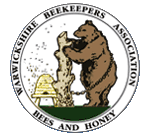Keeping bees is, of course, why we are here!
If you want to keep bees, or just find out a bit more about what is involved, we recommend you join one of our branches. They will have taster days, Introduction to Beekeeping Courses, a training apiary and of course lots of other beekeepers who are ready and willing to share their knowledge with you.
However here are some quick pointers as to what is involved in becoming a beekeeper:
Lets break this down:
Let’s start with the ‘big’ commitments of time and money:
Time
Hive inspections are not optional. From late April until sometime in July (i.e. during the swarming season) you have to inspect colonies at weekly intervals. Where weekly means 7 days and not 9, 10, 12……..
Hive inspections involve heavy lifting (if you’re lucky) and possibly getting stung.
Don’t take up beekeeping if you cannot allocate this time, at these times, to your hobby.
Costs
You will need somewhere to keep your bees – a hive! They can be made from wood (cedar is considered best) or polystyrene. You might get a 2nd hand one from a retiring beekeeper or a number of the equipment vendors do low cost ‘bees on a budget’ hives. And ideally you will have 2 hives. A bees on a budget hive is about £160.
Equipment
You’ll need
a beesuit (£50 – £100’s),
a smoker (£15 – £80),
a hive tool (£6 – £15)
wellington boots and gloves (marigolds are fine)
and that’s it!
Seriously, that’s all you really need to start beekeeping. Yes, there are hundreds of tools, gadgets, devices that you could buy (and probably will if you keep bees for a number of years) but to start beekeeping this is all you need.
Oh, and you’ll need bees.
You could set up a ‘bait hive’ to attract a passing swarm and get bees for free but we wouldn’t recommend that as a beginner.
You might be able to buy a nuc (nucleus, essentially a mini or starter hive) of bees from someone at your local association and there are plenty of bee farmers who sell nucs (£150-£250).
Training
We’ve saved the most important bit to last!
People do get all the equipment, get their bees, start beekeeping and then go on a Beginners course.
We would strongly recommend that you go on a course before you get your bees; indeed before you spend any monies as actually handling the bees and seeing in some detail what is involved might make you reconsider whether beekeeping is really for you.
All the Branches of Warwickshire Beekeepers run Beginners Beekeeping courses (COVID-19 permitting) so the very first thing you should do when considering becoming a beekeeper is to join you local branch. Once you have done your Beginners course you will find the the members a source of help and support especially through the first 2-3 years of beekeeping, generally thought to be the most challenging.
To find out which branch is nearest to you click here to go to our Join Us page


